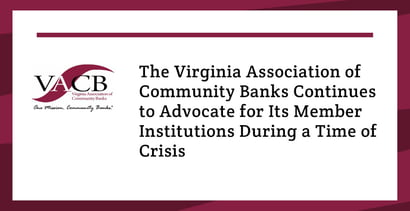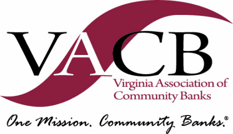

In a Nutshell: Despite constituting the bulk of banking institutions in the U.S., community banks can struggle to have their voices heard over those of the bigger national banks. The Virginia Association of Community Banks works to ensure that its member institutions are not overlooked when it comes to financial policies and regulations. The organization has worked diligently to adjust during the COVID-19 pandemic. This means it continues to serve its members in a number of ways. As federal programs are created to help banks and small businesses, the VACB communicates with legislators and disseminates the latest news and information to members as quickly as possible.
Although more than 50,000 community banks operate in the U.S. and constitute 99% of all banks, some experts believe the federal banking rules and regulations are too often one-size-fits-all. This means they may ignore the significant differences between Wall Street megabanks and smaller community-based institutions.
That’s why, on any given day, Steve Yeakel, President and CEO of the Virginia Association of Community Banks (VACB), works diligently with his team to amplify the voices of its member institutions.
But lately, days haven’t been normal.
 The rapid spread of COVID-19 across the country has thrown lives, businesses, and the economy into disarray. Yeakel was attending an annual banking convention in Florida in early March just as the news about the coronavirus being active in the U.S. was proliferating through the media.
The rapid spread of COVID-19 across the country has thrown lives, businesses, and the economy into disarray. Yeakel was attending an annual banking convention in Florida in early March just as the news about the coronavirus being active in the U.S. was proliferating through the media.
“So, I returned to Virginia not really knowing what to expect, and was hit with an entirely new reality, with social distancing, extreme cleaning and all that went with it,” he said. “And we went to shelter-in-place not long after that. I went from the challenges of business travel to the realization that we were going to have to address the very significant organizational, personal, and familial impact of this very challenging disease.”
From mid-March through April, Yeakel worked in the association office alone while the other VACB employees worked from home, continuing to carry out the organization’s mission to advocate for community banks while delivering important information and educational resources.
We recently spoke with Yeakel to learn more about the VACB’s everyday mission to stand up for its member institutions and what this means for the organization and its members during the COVID-19 pandemic.
Working to Educate and Advocate For Its Member Banks
The Virginia Association of Community Banks has been working for more than four decades to advocate tirelessly for its member institutions in the state. The VACB currently serves 59 community banks of varying sizes in Virginia.
“A community bank is one which has its own name, board of directors and management, and which gathers deposits and makes loans primarily within a specific localized trade area,” according to the organization’s website.
The VACB also represents companies that provide services to its member banks.

Steve Yeakel is the President and CEO of the VACB.
With advocacy at the core of its mission, the organization’s efforts in protecting and speaking up for community banks are always front and center.
“VACB is instrumental in promoting the public policy agenda of Virginia’s community banks,” according to the website. “Both VACB Officers and Leadership Bankers work with legislators, regulators, and the media to ensure that the position of local financial institutions is always represented.”
Education is another key component of the VACB’s mission. The association has had to shift its programming from in-person to online, but enthusiasm and participation remain strong.
Member institutions also gain access to VACB’s quarterly publication, “The Community Banker,” which features content created specifically for community banks and the businesses that serve them. They also receive email content addressing association events, banker news, and other relevant information.
The organization also hosts a wide variety of courses, programs, and other events for member organizations to stay on top of the latest news, training, and regulations within the industry.
“Compliance and regulatory burden continue to be significant issues for community banks and contribute to the continuing shrinkage in the number of community banks in the U.S.,” wrote VACB Chairman Lloyd Harrison on the organization’s website. “It is an unfortunate fact of life that community banks get hit disproportionately by these burdens.”
That’s why, perhaps now more than ever, VACB is upholding its duty to inform these institutions.
Serving as Economic First Responders During the Coronavirus Pandemic
Along with the realization that the COVID-19 pandemic was going to bring up serious challenges on an organizational and personal level came the understanding that bankers would be faced with serious challenges as well, Yeakel said.
“Our members are first responders to the economic side of things,” he said.
That means while the federal government is scrambling to quickly address the detrimental economic impact of the pandemic, the VACB is working directly with banks and businesses that are likely to be some of the hardest hit. But Yeakel was impressed with the quick work from the legislative branch.
“Congress did amazing work to build a bill in a week, which is unheard of,” Yeakel said, referring to the CARES Act. “Following that feat, the Small Business Association (SBA) built a program in a week, which is just this side of unbelievable.”

The VACB is working to translate and disseminate information as quickly as possible to member institutions during the COVID-19 pandemic.
All of these actions have left the VACB with plenty of work to do while adapting to the new environment.
“Ever since then, we’ve been building the airplane while it flies,” Yeakel said. “It’s been challenging and rewarding.”
As far as keeping everything running smoothly for all of its stakeholders, Yeakel said it’s a matter of being able to wear multiple hats.
“Under the policy hat, we work with our members of Congress so they understand the challenge that we have presently,” Yeakel said. “As most people agree that some additional sort of additional stimulus effort will be needed, what does the policy look like going forward?”
Under the other hat, he said he spends a large portion of his days serving as the equivalent of a help desk for members.
“If you envision a very narrow tube as the infrastructure that the SBA has been using to serve all of its loans over the course of the year, and then figure that within two weeks the volume there will increase by some exponential amount — it’s been a real challenge to navigate,” Yeakel said.
The SBA brought in Amazon Web Services to help build up more infrastructure, but banks struggled to get help, he said. Even banks with longstanding relationships with the SBA have had trouble gaining access to the system.
“But we tried to facilitate information, whether it was getting interpretations of regulations and the guidance that’s been put out or more granular compliance questions,” Yeakel said. “We were here to do it all, and we were busy 10-plus hours a day.”
Between April 6 and April 20, Yeakel had 637 individualized contacts with VACB member bankers, in almost every member bank – an average of 45 individual contacts per day, for 14 straight days. The only topic – how the Paycheck Protection Program could be implemented most effectively in each bank to aid the small businesses served by VACB bankers.
In addition to the individual bank contacts, Yeakel sent 27 updates and alerts to all member bank leaders and 36 messages to smaller groups of members. He also had 73 interactions with senior Virginia Congressional staff, 60-plus interactions with key contacts at ICBA, and 30-plus contacts with his peers leading ICBA affiliates across the nation.
Pivoting to Take on New Challenges While Remaining Impactful for Community Banks
With education playing a central role in the functions of the Virginia Association of Community Banks, the organization has had to make some adjustments recently in its numerous meetings, events, and classes.
Thankfully, Yeakel said, the association has been able to adjust without having to focus too much of its efforts internally to the point where it impacts members.
The organization has rescheduled certain upcoming events, moved some events online, and even added some virtual events for the coming months.

The organization has been able to quickly reschedule or adjust events accordingly to continue to serve its member institutions.
“Our Vice President for Education is very well organized and very comprehensive in our planning process,” Yeakel said. “We had four live seminars scheduled for the first part of the year that were relatively easy to reschedule.”
He said the association’s vendors have also been very supportive in its plans to adjust events accordingly.
“As more bankers are working remotely, VACB has put together several timely programs being offered as virtual, live programs,” according to the website.
In late March, the association offered a free webinar to members, titled “Pandemic Preparedness: Managing Coronavirus & Other Epidemics.” The program addressed how to determine risks that management teams are facing, how institutions can minimize the impact of the current crisis, and how to quickly create and implement a crisis plan.
And, as of the time of this writing, the VACB’s annual October convention is still on the books. Normally, hosting a large convention in the fourth quarter of the calendar year can be financially challenging.
“But right now, nothing gives us more positive focus than envisioning a mid-October convention,” Yeakel said. “The convention committee is meeting and the plans look great. Only time will tell whether changes will need to be made. Almost all of our peer organizations have had to cancel their summer convention.”
In these challenging times, many uncertainties remain for the physical and economic health of the U.S. But members of the Virginia Association of Community Banks can rest assured knowing the organization is working harder than ever to make sure these important institutions have a seat at the table during and after this crisis.
Advertiser Disclosure
BadCredit.org is a free online resource that offers valuable content and comparison services to users. To keep this resource 100% free for users, we receive advertising compensation from the financial products listed on this page. Along with key review factors, this compensation may impact how and where products appear on the page (including, for example, the order in which they appear). BadCredit.org does not include listings for all financial products.
Our Editorial Review Policy
Our site is committed to publishing independent, accurate content guided by strict editorial guidelines. Before articles and reviews are published on our site, they undergo a thorough review process performed by a team of independent editors and subject-matter experts to ensure the content’s accuracy, timeliness, and impartiality. Our editorial team is separate and independent of our site’s advertisers, and the opinions they express on our site are their own. To read more about our team members and their editorial backgrounds, please visit our site’s About page.
